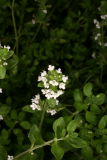Additional notes (click to expand)
Medicinal
In traditional medicine the leaves, and especially the essential oil contained in them, are strongly antiseptic, deodorant and disinfectant. The plant can be used fresh at any time of the year, or it can be harvested as it comes into flower and either be distilled for the oil or dried for later use. The leaves contain an antioxidant and regular use of the raw leaves has been shown to increase average life expectancy by about 10%. The essential oil obtained from this plant is thought to be less irritant than other thyme oils and so it is used in aromatherapy to treat asthma and other respiratory complaints, especially in children[The leaves, and especially the essential oil contained in them, are strongly antiseptic, deodorant and disinfectant[200, 238]. The plant can be used fresh at any time of the year, or it can be harvested as it comes into flower and either be distilled for the oil or dried for later use[238]. The leaves contain an antioxidant and regular use of the raw leaves has been shown to increase average life expectancy by about 10%. The essential oil obtained from this plant is thought to be less irritant than other thyme oils and so it is used in aromatherapy to treat asthma and other respiratory complaints, especially in children[238].].
https://pfaf.org https://pfaf.org/user/Plant.aspx?LatinName=Thymus+x+citriodorus
Nomenclature
basionym: Lamiaceae Thymus serpyllum L. subsp. citriodorus Pers. Syn. Pl. (Persoon) 2(1): 130. 1806 [Nov 1806]. Hybrid parents: T. pulegioides × T. vulgaris.
Thymus x citriodorus (Pers.) Schreb.
Family: LAMIACEAEGenus: Thymus
Species: citriodorus (Pers.) Schreb.
Common names: Lemon Thyme
Distribution summary: Only cultivated
Conservation status (IUCN Red List): Least Concern
Habit: Shrub
Hardiness: H5 - Hardy; cold winter
Garden status: Currently grown
Garden location: Europe & Mediterranean (E)
Flowering months: May, June
Reason for growing: Medicinal, other use
